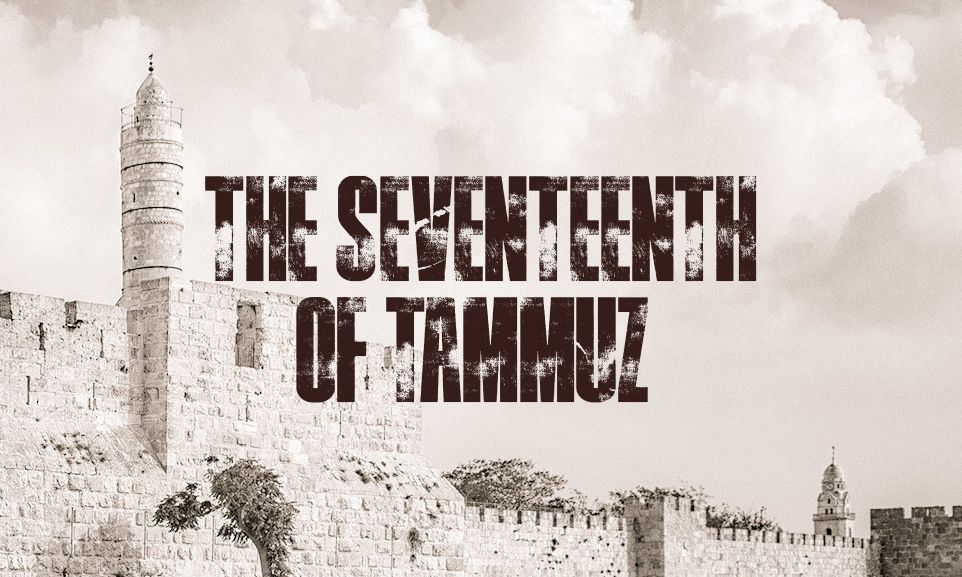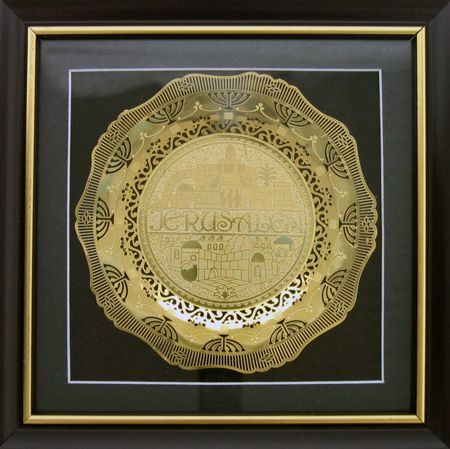
The Seventeenth of Tammuz
On the seventeenth of Tammuz, Jews throughout the world fast to commemorate the many calamities that have befallen our people on that ominous day... [see video by Rabbi Dayan Elgrod of Chut Shel Chesed about the laws of the Three Weeks]

On the seventeenth of Tammuz Jews throughout the world fast to commemorate the many calamities that have befallen our people on that ominous day.
Rabbi Eliyahu Kitov writes in “Book of Our Heritage” that the purpose of these fasts are “to awaken hearts towards repentance through recalling our forefathers’ misdeeds; misdeeds which led to calamities….”
A Historic Day of Tragedy
In the Desert — On the seventeenth of Tammuz, Moshe (Moses) descended Mount Sinai, and, upon seeing the Golden Calf, broke the first set of Tablets carrying the Ten Commandments (Shemot 32:19, Mishna Taanit 28b).
During the First Temple – The priests in the First Temple stopped offering the daily sacrifice on the seventeenth of Tammuz (Taanit 28b) due to the shortage of sheep during the siege and the next year, 3184 (586 BC) the walls of Jerusalem were breached after many months of siege by Nebuchadnezzar and his Babylonian forces.
In the time of the Kings – According to tradition, King Menashe, one of the worst of the Jewish kings, had an idol placed in the Holy Sanctuary of the Temple (Melachim II 21:7). The Talmud (Masechet Taanit 28b) says that in the time of the Roman persecution, Apostomos, captain of the occupation forces, did the same and publicly burned the Torah, both acts considered open blasphemy and desecration. These were followed by Titus and Rome breaching the walls of Jerusalem in 3760 (70 CE).
The Seventeenth of Tammuz continued to be a day of tragedy for the Jewish People. In 1391, more than 4,000 Jews were killed in Toledo and Jaen, Spain. In 4319 (1559), the Jewish Quarter of Prague was burned and looted.
The Kovno ghetto was liquidated on the Seventeenth of Tammuz 5704 (1944) and in 5730 (1970) Libya ordered the confiscation of Jewish property.
The Mishna in Taanit 4:8 says that the seventeenth of Tammuz is the “Fast of the Fourth Month” mentioned by the prophet Zechariah. According to this Mishna, in the messianic era, the seventeenth of Tammuz will be transformed into a day that “shall be joy to the House of Judah, full of gladness and cheerful feasts.”
Customs
The Fast of 17th of Tammuz is observed from the break of dawn until night (as defined by halacha) one of the four Jewish fasts to be observed in this manner. The other fasts are the Fast of Gedalia on the 3 Tishrei, the Tenth of Tevet, and Taanit Esther on the 13 of Adar.
Expecting or nursing mothers, and those who are ill, should not fast. They should, however, refrain from meat, luxurious food, and hard liquor. Washing and wearing leather shoes is permitted. The 17th of Tammuz marks the beginning of the Three Weeks, an annual period of mourning over the destruction of the First and Second Temples in Jerusalem.
(Used with permission from www.ou.org)
Watch a 30-minute video by Rabbi Dayan Elgrod of Chut Shel Chesed about the laws of the Three Weeks.










Tell us what you think!
Thank you for your comment!
It will be published after approval by the Editor.